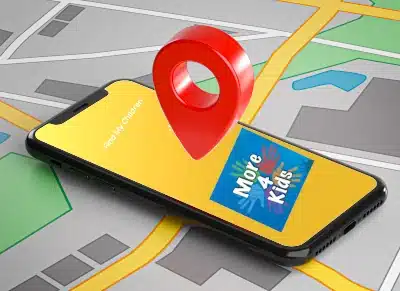
Benefits of digital tracking
Table of Contents
One of the most obvious benefits of digital tracking is the assurance it provides us as parents that children are safe and secure. GPS-enabled tracking devices and apps allow us to monitor our children’s whereabouts and receive alerts if they go outside a defined area. This can be particularly useful when children travel alone, as parents can monitor their journey and ensure they arrive safely. Tracking devices can help locate lost or missing children quickly, potentially saving lives.
Digital tracking can also provide valuable information about children’s behavior and habits. For example, some tracking devices have sensors that can monitor children’s activity levels, sleep patterns, and other health metrics. This data can be used to identify potential health problems or behavioral issues and address them before they become more serious.
Drawbacks of digital tracking

Another potential drawback of digital tracking is that it may create a false sense of security. While tracking devices provide valuable information and alerts, they cannot replace adult supervision or intervention. Parents may rely too heavily on monitoring devices and fail to take other safety measures, such as teaching children about stranger danger and appropriate online behavior.
Ethical considerations
The use of digital tracking for children raises critical ethical considerations, particularly around privacy and autonomy. Children have a right to privacy, and the constant monitoring and tracking of their every move can erode that right. We need to balance the need to ensure children’s safety with their right to privacy.
Additionally, digital tracking devices and apps may collect sensitive personal data, including location data, health metrics, and online behaviors. This data is valuable and can provide insights into children’s behavior and needs. Still, it also raises concerns about who has access to that data and how it will be used.
Recommendations for Digital Tracking
While digital tracking can provide valuable benefits, it is vital to consider the potential drawbacks and ethical issues before deciding to use tracking devices or apps for children. Parents and caregivers should carefully consider their needs and weigh the potential benefits and drawbacks of tracking devices before implementing them.
Here are some recommendations:
Be transparent with children about the use of tracking devices and apps. Explain why they are being used and how they work.
- Educate children about online safety and appropriate online behavior.
- Establish clear boundaries and rules around tracking devices and apps. Explain what information will be collected and how it will be used.
- Use tracking devices and apps to complement other safety measures, not as a replacement for adult supervision.
- Choose tracking devices and apps that prioritize privacy and data security.
- Advocate for strong regulations and standards for using tracking devices and apps for children and, more importantly, the data privacy of the used apps.
Let us look a little closer at tracking options.
GPS Tracker for Kids: Ensuring a Safe and Secure Environment
As a parent, keeping your child safe and secure is always a top priority. However, in today’s fast-paced and digitally-connected world, it can be challenging to keep track of your child’s whereabouts all the time. Thankfully, GPS tracking technology can help you monitor your child’s location accurately and discreetly.
Here’s everything you need to know about GPS trackers for kids:
What is a GPS Tracker for Kids?
A GPS tracker for kids is a small device that uses global positioning system (GPS) technology to track and locate the exact position of a child. It can be attached to a child’s clothing, backpack, or shoes, making it easy for parents to track their child’s location in real time.
How Can GPS Trackers Help Keep Kids Safe?
GPS trackers are a great way to ensure your child’s safety, especially during outdoor activities or when traveling. By checking the location of your child’s GPS tracker, you can quickly identify if they are in a safe area. You can take necessary action to keep them safe if they are not.
GPS trackers can also provide peace of mind to parents with teenagers who are driving. With the help of a GPS tracker, you can monitor your teenager’s driving behavior and ensure they are not engaging in risky or dangerous behavior on the road.
Types of GPS Trackers for Kids
GPS trackers for kids come in various forms, including GPS watches, tracking devices, and location-tracking apps. Here are some of the most popular GPS trackers for kids:
GPS Watch for Kids
A GPS watch for kids is a watch that incorporates GPS tracking technology. It is a wearable GPS tracker that can provide parents with real-time location updates on their child’s whereabouts. GPS watches are designed for kids, so they are durable and easy to use. They also have features like an SOS button that children can use to alert their parents in emergencies.
Tracking Device for Kids
A tracking device for kids is a small, portable GPS tracker that can be attached to a child’s backpack, clothing, or shoes. These tracking devices are discreet and can provide accurate information on a child’s location in real-time to parents or caregivers.
Location Tracking Devices
Some location tracking devices are designed to send location updates to parents’ smartphones. They are usually small in size and can be attached to a keychain or placed in a backpack. These devices are affordable and easy to use.
Tracking App for Parents
Many tracking apps for parents work by sending location updates to a parent’s smartphone or tablet. These apps are easy to install and can provide parents with real-time location updates on their child’s whereabouts. Some apps come with additional features like geofencing and panic buttons that children can use to alert their parents in an emergency.
GPS Safety Tracker
GPS safety trackers are specifically designed for children with special needs, like autism or ADHD. These GPS trackers are integrated into clothing or shoes, so children can wear them without feeling self-conscious. They also have features like geofencing and SOS buttons that can alert parents in an emergency.
Watch Tracking Device
A watch-tracking device is a GPS tracker designed to look like a regular watch. It can provide parents with real-time location updates on their child’s whereabouts, and it also comes with features like geofencing and SOS buttons.
Phone Tracking App for Parents
Phone tracking apps for parents are designed to track a child’s phone through the GPS signal. These apps provide parents with real-time location updates on their child’s location. Some apps also come with features like geofencing and panic buttons.
Here are some of the best tracking apps for parents:
1. FamiSafe
FamiSafe is a reliable tracking app that can help parents accurately monitor their child’s location. It offers a range of features, including real-time location tracking, geofencing, and screen time management.
2. Life360
Life360 is a popular tracking app that offers location tracking, geofencing, and location history. It also comes with a panic button that children can use to alert their parents in an emergency.
3. Find My Kids
Find My Kids is a GPS tracker that offers real-time location updates, geofencing, and parental controls for app usage. It also provides location history to help parents keep track of their child’s movements.
GPS Tracker for Teenagers
GPS trackers for teenagers are designed to help parents securely monitor their child’s location. Here are some of the best GPS trackers for teenagers:
1. Spyzie
Spyzie is a versatile app that can help parents monitor their child’s location, call logs, and websites visited. It also provides a range of parental controls for social media usage.
2. Family Locator
Family Locator is a popular GPS tracker that offers real-time location updates, geofencing, and location history. Parents can also use the app to set location-based reminders for their teenagers.
3. Life360
Life360 is an all-in-one family locator with features like location tracking, geofencing, and safe driving alerts. It also comes with a panic button that children can use to alert their parents in an emergency.
Phone Trackers for Parents
Phone trackers for parents are a great way to track a child’s phone and monitor their location. Here are some of the best phone trackers for parents:
1. Google Maps
Google Maps is a free app that offers location tracking and real-time updates. Parents can easily track their child’s location by sharing it through Google Maps.
2. Find My iPhone
Find My iPhone is a built-in feature of iPhones that helps locate a lost or stolen device. It also has a real-time location tracking feature for parents to monitor their child’s location.
3. Family Orbit
Family Orbit is a reliable app with real-time location tracking, geofencing, and emergency alerts. Parents can also use the app to monitor their child’s phone usage and set up parental controls.
Tracking Device for Teenagers
Tracking devices for teenagers can help parents monitor their child’s location discreetly. Here are some of the best tracking devices for teenagers:
1. AngelSense
AngelSense is a tracking device designed for children with special needs. It offers real-time location tracking, geofencing, and voice monitoring.
2. Bouncie
Bouncie is a GPS tracker that offers real-time location updates, driving history, and alerts for speeding or unsafe driving behavior. It can help parents monitor their teenager’s driving habits and is easy to use and install.
Free Tracking Apps for Parents
Free tracking apps for parents can help monitor a child’s location and keep them secure. Here are some of the best free tracking apps for parents:
- Find My Kids
Find My Kids is a free GPS tracker with real-time location updates and geofencing. It also offers a panic button that children can use to alert their parents in an emergency.
- Google Maps
Google Maps is a free app that offers location tracking and real-time updates. Parents can easily track their child’s location by sharing it through Google Maps.
- Life360
Life360 is a popular GPS tracker with location tracking, geofencing, and location history. It also comes with a panic button that children can use to alert their parents in an emergency.
Best Location Tracking App for Parents
The best location tracking app for parents can help ensure your child’s safety and provide peace of mind. Here are some of the best location-tracking apps for parents:
- FamiSafe
FamiSafe is a dependable tracking program that enables parents to precisely follow the whereabouts of their children. A number of functions are available, such as screen time management, geofencing, and real-time location tracking.
- Life360
Popular tracking software called Life360 provides location tracking, geofencing, and location history. Additionally, it has a panic button that kids can press to notify their parents in case of an emergency.
- Find My Kids
A GPS tracker called Find My Kids provides geofencing, real-time location updates, and parental controls for app use. In order to assist parents in monitoring their child’s movements, it also offers location history.
Alternatives to Digital Tracking
While digital tracking can be a helpful tool in monitoring children’s safety, it is essential to consider alternative or supplementary methods that respect their privacy and autonomy. Traditional parenting practices, community-based initiatives, and educational programs can all contribute to a more balanced approach to ensuring children’s well-being.
Open Communication: Encouraging open and honest communication with children is vital in fostering trust and understanding their needs. By regularly talking with children about their daily activities, parents can stay informed and address any concerns without invasive tracking methods.
Teaching Personal Safety: Educating children about personal safety, such as avoiding talking to strangers, knowing when to ask for help, and understanding the importance of safe spaces, can empower them to make responsible decisions and stay safe without constant monitoring.
Community Support: Building a strong community network with neighbors, schools, and local organizations can create a secure environment for children. Parents can rely on this support system to ensure their children’s well-being and share the responsibility of monitoring and safeguarding their community.
Educational Programs: Enrolling children in programs that promote personal development, social skills, and self-awareness can help them make informed choices and develop a strong sense of responsibility for their own safety.
Balancing Digital Tracking with Other Safety Measures: It is crucial to combine digital tracking with these alternative methods for a comprehensive approach to child safety. By doing so, parents can respect their children’s privacy and autonomy while still ensuring their security and well-being.
A balanced approach to child safety should involve a mix of digital tracking and alternative methods that prioritize open communication, personal safety education, and community support. By doing so, parents can foster a safe and nurturing environment for their children without compromising their privacy and autonomy.
Final Thoughts on Digital Parenting
There are many digital tracking tools available today. GPS trackers for kids can help parents ensure their child’s safety and security. With a range of options, a GPS tracker is available to suit every family’s needs. Whether it’s a GPS watch, tracking device, or app, parents can have peace of mind knowing that they can locate their child accurately and discreetly.
Digital Tracking FAQ
What are the benefits and drawbacks of using digital tracking devices or apps to monitor children’s activities and behaviors?
Digital tracking offers safety assurance and valuable information on children’s habits, but may also impact privacy and autonomy, as well as create a false sense of security.
What ethical considerations should parents and caregivers be aware of when using digital tracking technology for children?
Ethical considerations include balancing children’s safety with their right to privacy and addressing concerns about data collection and usage.
What are some recommendations for parents and caregivers to ensure responsible use of tracking devices and apps for children?
Recommendations include being transparent with children, educating them about online safety, setting boundaries, using tracking as a complement to other safety measures, and prioritizing privacy and data security.
How do GPS trackers for kids work, and what are the different types available for ensuring child safety?
GPS trackers for kids use global positioning system technology to locate a child in real-time, and come in various forms such as GPS watches, tracking devices, and location-tracking apps.
What are some of the best tracking apps and devices available for parents to monitor their children’s whereabouts and ensure their safety?
Some of the best tracking apps and devices include FamiSafe, Life360, Find My Kids, AngelSense, and Bouncie, each offering unique features to help parents monitor their children’s location and safety.











Add Comment